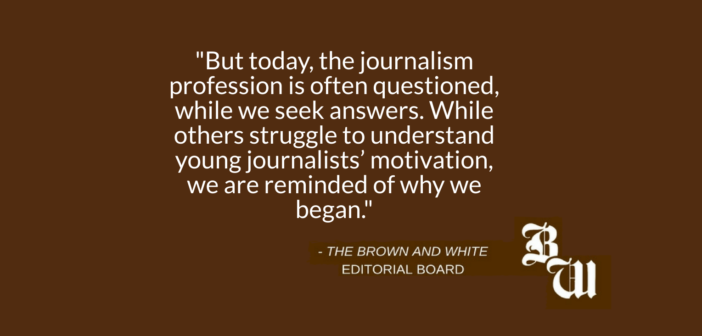“So what are you going to do with a journalism degree?” concerned relatives ask over lengthy holiday dinners.
As journalists, we have been trained to ask the hard questions and write the stories that matter. But today, the journalism profession is often questioned, while we seek answers. While others struggle to understand young journalists’ motivation, we are reminded of why we began.
Journalists do not seek the truth for ourselves. Instead, we write and report for stories that otherwise may never be heard. We document history that otherwise may never be remembered.
To answer the popular question of what we will do with our degrees, the answer varies for all of us. But one thing remains true for all students pursuing journalism: we are motivated by the bravery of past journalists, an obligation to the truth and duty to its citizens, and we work to ensure the journalists who come after us are propelled forward by the work that we do today, as the field modernizes.
According to an Associated Press article, enrollment in journalism programs is up. After years of declining enrollment, college journalism programs are training pools of motivated, unwavering journalists.
While student publications are hungry to provide news to the people, threats to newsrooms across the country are often a cause of concern. In the past year, “weekday print circulation decreased 12 percent, and Sunday print circulation decreased 13 percent.” Between 2010 and 2018, the total number of employees in newsrooms decreased by 31 percent.
While these numbers raise many questions regarding the future of journalism, for those that spend their days in the newsroom, the answer is clear. We need news and truth-seekers now more than ever. While demand has changed and threatened print journalism, the next generation of journalists is prepared to adapt.
Just like the answer to the question, “What will you do with a journalism degree?,” newsrooms are constantly changing. Local newsrooms are investing in digital technology and experimenting with new sources of revenue, such as paywalls, subscriptions and e-commerce.
Journalism classes extend beyond traditional news. Journalism students are taught how to create effective websites, how to maximize the value of social media and how to strategically communicate complex stories. Students learn how to create a holistic news package, as we compile infographics, photos and videos to complement stories. But as pages are digitized, our principles remain the same.
Tagging such reports as “fake news” and the reporters behind them as “the enemy of the people,” President Donald Trump has worked to instill distrust in the press.
The First Amendment engraves the importance of the press in the foundation of our nation. When speaking of the press, Thomas Jefferson said, “Were it left to me to decide whether we should have a government without newspapers or newspapers without a government, I should not hesitate a moment to prefer the latter.”
While friends and relatives may question what we will do with a journalism degree, young journalists have the defense of powerful and steadfast journalists of the past and the great potential of the field’s future.
From some of the first print journalists, including Benjamin Franklin and Joseph Pulitzer, to pioneers in the broadcast industry, such as Dan Rather and Barbara Walters, journalists have refused to take the backseat in history.
It is ironic to think that aspiring journalists are deterred by a challenge.
The Obama administration set a record in the percentage of Freedom of Information Act ( FOIA) requests answered with either redacted files or nothing at all: 77 percent. And while the current administration attempts to uproot the press, more young journalists are studying and preparing to protect the power of truth.
As enrollment in journalism programs increases, it is important that we continue to empower the journalists who surround us and support the work they do — both locally and nationally. While we are training to embark on our careers, it is important to remember that our work has already begun. Each day our newsroom seeks the truth is a day we choose to fight for journalism’s future.
We will continue to ask the hard questions. We will not run from a challenge. Instead, we will seek the truth, regardless of what stands in our way.
Attempts to diminish the work of journalists simply draw more young people to the field. Nothing exemplifies the power of the press quite like journalists’ drive to walk towards those that attempt to hold us back.






Comment policy
Comments posted to The Brown and White website are reviewed by a moderator before being approved. Incendiary speech or harassing language, including comments targeted at individuals, may be deemed unacceptable and not published. Spam and other soliciting will also be declined.
The Brown and White also reserves the right to not publish entirely anonymous comments.